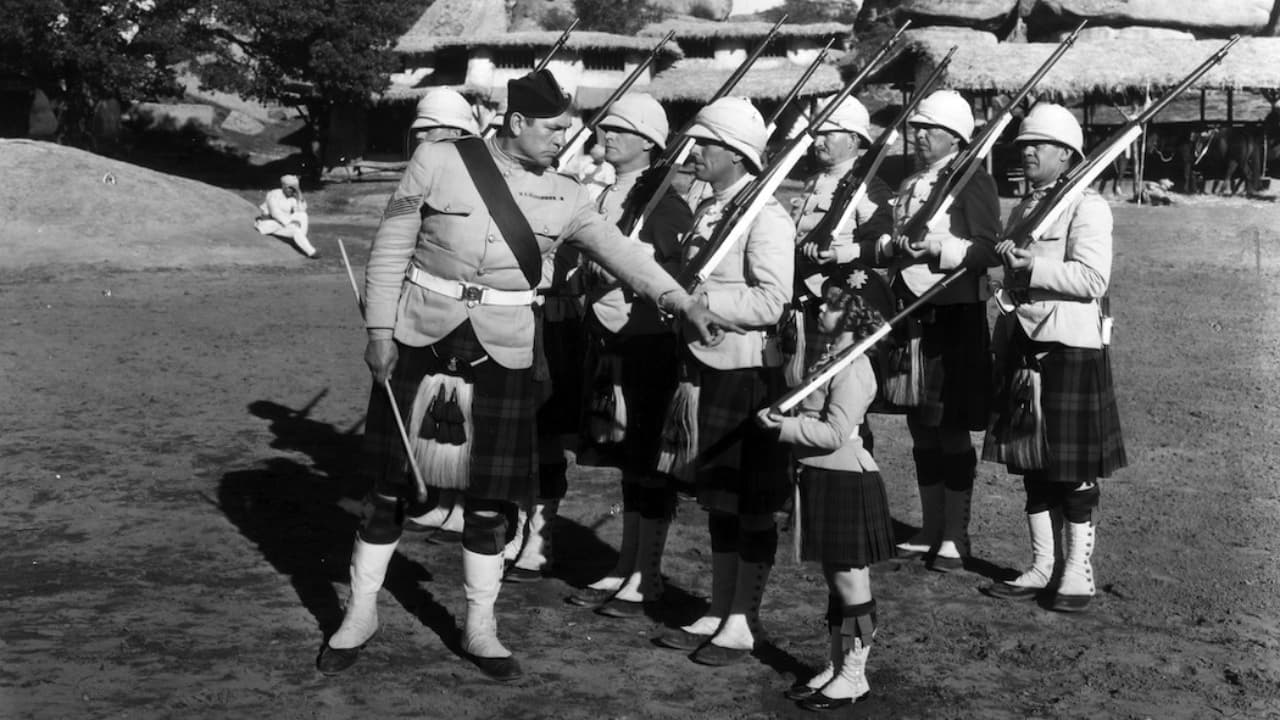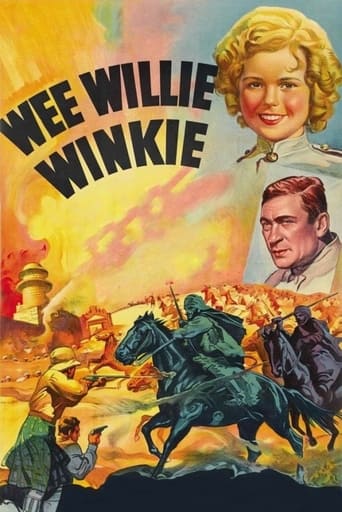Incannerax
What a waste of my time!!!
Steinesongo
Too many fans seem to be blown away
ThedevilChoose
When a movie has you begging for it to end not even half way through it's pure crap. We've all seen this movie and this characters millions of times, nothing new in it. Don't waste your time.
Myron Clemons
A film of deceptively outspoken contemporary relevance, this is cinema at its most alert, alarming and alive.
Tom Dale Keever
Graham Green published the following review of Wee Willie Winkie. Both he and the magazine Night and Day were sued by Shirley Temple's studio and her guardians. The magazine was bankrupted and Greene fled to Mexico, where he found the material for his novel, The Power and the Glory. When Greene's film criticism was collected in the volume "The Pleasure Dome" this review was omitted. Night and Day, October 28, 1937 The Films by Graham GreeneWee Willie WinkieThe owners of a child star are like leaseholders — their property diminishes in value every year. Time's chariot is at their backs: before them acres of anonymity. What is Jackie Coogan now but a matrimonial squabble? Miss Shirley Temple's case, though, has peculiar interest: infancy with her is a disguise, her appeal is more secret and more adult. Already two years ago she was a fancy little piece — real childhood, I think, went out after The Littlest Rebel). In Captain January she wore trousers with the mature suggestiveness of a Dietrich: her neat and well-developed rump twisted in the tap-dance: her eyes had a sidelong searching coquetry. Now in Wee Willie Winkie, wearing short kilts, she is a complete totsy. Watch her swaggering stride across the Indian barrack-square: hear the gasp of excited expectation from her antique audience when the sergeant's palm is raised: watch the way she measures a man with agile studio eyes, with dimpled depravity. Adult emotions of love and grief glissade across the mask of childhood, a childhood skin-deep.It is clever but it cannot last. Her admirers — middle aged men and clergymen — respond to her dubious coquetry, to the sight of her well-shaped and desirable little body, packed with enormous vitality, only because the safety curtain of story and dialogue drops between their intelligence and their desire. "Why are you making my Mummy cry?" - what could be purer than that? And the scene when dressed in a white nightdress she begs grandpa to take Mummy to a dance - what could be more virginal? On those lines in her new picture, made by John Ford, who directed The Informer, is horrifyingly competent. It isn't hard to stay to the last prattle and the last sob. The story — about an Afghan robber converted by Wee Willie Winkie to the British Raj — is a long way after Kipling. But we needn't be sour about that. Both stories are awful, but on the whole Hollywood's is the better.
ccthemovieman-1
This was okay but Shirley Temple made enough better movies that this wasn't a "keeper"in the end. I still have at least a half dozen of her other films which, I thought, were far more appealing. They were also shorter, too. At 100 minutes, this is too long a movie for the normal Temple fare. It was her longest movie as a child actor. The major fault, which also involves the time, is that is simply wasn't that interesting.It has its cute moments as all Temple films did and the cinematography was good. The fact John Ford directed it may have something to do with the better-than-average photography. I also enjoyed Victor McLaughlen in here. He played the best character.
Neil Doyle
SHIRLEY TEMPLE has always said that WEE WILLIE WINKIE was her own personal favorite among her childhood films because it gave her a chance to indulge herself as a tomboy. And because it has a good script, fine all around performances and moves along at a nice clip, it's one of the best Temple vehicles, showing exactly why she was such a popular young child star.The story is a simple one, with Shirley and her mother (June Lang) arriving at a British military outpost in India under the gruff but lovable protection of the colonel (Sir C. Aubrey Smith). Temple immediately wants to join in the marching and soldiering and McGlaglen is assigned to teach her the ropes. Therein lies the film's strongest bits of interplay between Temple and a co-star of equal scene-stealing abilities. There is genuine bathos in their ultimate scene together, with Shirley rendering a sweet rendition of Auld Lang Syne while the soldier lies on his deathbed.There are John Ford touches everywhere, so it's no surprise that the picture still holds up pretty well today. Temple fans will not be disappointed. Shirley fits the role of the tomboyish Priscilla with abundant good humor and a considerable amount of innocent charm.In secondary roles, there is an unobtrusive romance between Michael Whalen and June Lang and a surprising comedy bit by Constance Collier as a snooty matron urging her daughter to be less "anemic" so she can catch the eye of a soldier. Willie Fung as a spy adds some additional comic relief although the PC crowd will probably cringe at his antics.Ideal family entertainment.
Ron Oliver
India - the 1890's - the North-West Frontier. Precocious young Priscilla arrives with her widowed mother to live with the grandfather they've never met, a stern old Army Colonel. Gaining the nickname of Private WEE WILLIE WINKIE, the little girl quickly charms nearly everyone around her, including a tough Scots Sergeant. But it is her influence with the local bandit chief that portends the greatest impact on all their lives.This was arguably Shirley Temple's finest film. It is certainly her most lavish. Fox & director John Ford fashioned a mini-epic with great atmosphere and much to please family viewers. The detailed sets & huge cast of extras do the picture proud.Shirley is wonderful, as usual, in her own unique way, but this time she has a couple of co-stars that can hold their own with her. Victor McLaglen is every inch the embodiment of a bluff British sergeant - and well he should, given his real-life background as a boxing champion and Provost Marshal of Baghdad. Gruff & tender by turns, he gives an unforgettable performance. As Shirley's grandfather, marvelous old Sir C. Aubrey Smith gives another sterling portrayal as the archetype of the colonial officer class - crusty & domineering.The rest of the cast is equally enjoyable: Cesar Romero as the chieftain; June Lang & Michael Whalen as Shirley's mother and her new lieutenant friend (fortunately their romance is unobtrusive); Willie Fung as the giggling, treacherous house boy; and Constance Collier as the waspish wife of a brigade officer.

